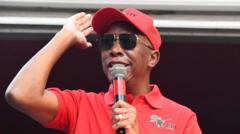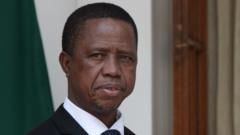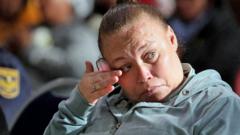**Amid rising tensions, the future of South Africa’s coalition government remains uncertain following a pivotal budget vote that highlighted deep-rooted divisions.**
**Is the South African Coalition Government on the Verge of Collapse?**

**Is the South African Coalition Government on the Verge of Collapse?**
**Recent budget vote exposes deep fractures between ANC and DA, risking national unity.**
South Africa’s coalition government faces potential disintegration following stark divisions between its leading parties, the African National Congress (ANC) and the Democratic Alliance (DA), during a crucial vote on the national budget. The DA, representing a centre-right stance, opposed the fiscal framework, which includes an unpopular increase in VAT, advocating instead for extensive cuts across governmental spending. The ANC, identifying as a centre-left party, rebuffed the DA's calls, labeling their proposal as an “austerity budget,” and managed to pass the fiscal framework with a 194 to 182 vote, gaining backing from smaller political entities.
The DA has taken legal action, contesting the legitimacy of the vote, stating it was "procedurally flawed", and leadership discussions are underway to evaluate their participation in what is locally termed a government of national unity (GNU). Political analyst Professor William Gumede from Wits University remarked on the DA's strategic dilemma of either exiting now or awaiting outcomes from their legal challenge.
The coalition formed less than a year ago when the ANC, under significant public scrutiny, found itself without a majority following elections. Economic stability was the primary motivation behind the coalition, driven by pressures from South Africa's business sector. Signs are mounting that the partnership may be crumbling; DA spokesperson Willie Aucamp condemned the ANC for a "serious infraction", asserting they have "crossed a line". Meanwhile, DA chair Helen Zille expressed caution, emphasizing that compromises were crucial in coalition governance.
Contrarily, the ANC portrayed the DA's moves as a betrayal of the coalition spirit. ANC parliamentary whip, Mdumiseni Ntuli, dismissed concerns, affirming the GNU continues with unwavering support from other coalition members. This conflict has seen the DA align with the country’s leading opposition factions, the Economic Freedom Fighters (EFF) and Jacob Zuma’s uMkhonto weSizwe, in opposition to the VAT hike, motivated by concerns over its impact on low-income citizens.
The ANC insisted the VAT increase, set at 0.5%, was essential for public service provisions—amidst a backdrop of deteriorating societal welfare. The coalition's complex dynamics were further highlighted by the support of the Inkatha Freedom Party (IFP) for the ANC, effectively unraveling their previous alliance with the DA established during the elections. The politics of coalition governance have complicated the landscape, with ActionSA—a minor opposition party formed from a DA split—aligning with the ANC after negotiating terms to nullify the VAT increase.
Scholar Gumede noted that the DA’s strategy portrays a civic-minded approach during economic struggles. A series of disparities between the two main parties hints at a tumultuous political future for South Africa, as the DA also contests multiple pieces of legislation in the courts. The economic implications of these legislative disputes are becoming increasingly precarious, especially as tariffs imposed by the US threaten to erode the struggling South African economy.
The tariffs were seen as punitive by Ramaphosa’s administration and an impetus for urgent resolution among political factions, as South Africa grapples with an unemployment rate surpassing 30%. In the face of escalating economic challenges, unity within leadership becomes paramount, or the country risks falling into deeper financial chaos.
The DA has taken legal action, contesting the legitimacy of the vote, stating it was "procedurally flawed", and leadership discussions are underway to evaluate their participation in what is locally termed a government of national unity (GNU). Political analyst Professor William Gumede from Wits University remarked on the DA's strategic dilemma of either exiting now or awaiting outcomes from their legal challenge.
The coalition formed less than a year ago when the ANC, under significant public scrutiny, found itself without a majority following elections. Economic stability was the primary motivation behind the coalition, driven by pressures from South Africa's business sector. Signs are mounting that the partnership may be crumbling; DA spokesperson Willie Aucamp condemned the ANC for a "serious infraction", asserting they have "crossed a line". Meanwhile, DA chair Helen Zille expressed caution, emphasizing that compromises were crucial in coalition governance.
Contrarily, the ANC portrayed the DA's moves as a betrayal of the coalition spirit. ANC parliamentary whip, Mdumiseni Ntuli, dismissed concerns, affirming the GNU continues with unwavering support from other coalition members. This conflict has seen the DA align with the country’s leading opposition factions, the Economic Freedom Fighters (EFF) and Jacob Zuma’s uMkhonto weSizwe, in opposition to the VAT hike, motivated by concerns over its impact on low-income citizens.
The ANC insisted the VAT increase, set at 0.5%, was essential for public service provisions—amidst a backdrop of deteriorating societal welfare. The coalition's complex dynamics were further highlighted by the support of the Inkatha Freedom Party (IFP) for the ANC, effectively unraveling their previous alliance with the DA established during the elections. The politics of coalition governance have complicated the landscape, with ActionSA—a minor opposition party formed from a DA split—aligning with the ANC after negotiating terms to nullify the VAT increase.
Scholar Gumede noted that the DA’s strategy portrays a civic-minded approach during economic struggles. A series of disparities between the two main parties hints at a tumultuous political future for South Africa, as the DA also contests multiple pieces of legislation in the courts. The economic implications of these legislative disputes are becoming increasingly precarious, especially as tariffs imposed by the US threaten to erode the struggling South African economy.
The tariffs were seen as punitive by Ramaphosa’s administration and an impetus for urgent resolution among political factions, as South Africa grapples with an unemployment rate surpassing 30%. In the face of escalating economic challenges, unity within leadership becomes paramount, or the country risks falling into deeper financial chaos.





















